There are times in life when we realise we’ve been holding on too tightly – to a grudge, to pain, to a version of the past that no longer serves us. Maybe someone hurt us and never acknowledged it – maybe it was something very obvious that happened. And maybe, just maybe, we’re still replaying that moment in our heads, wondering what we could have done differently, seeking revenge or avoiding situations altogether. The truth is, holding on to these negative emotions can feel strangely comforting – like a protective shield that we think will save us from ever feeling hurt again. But over time, it can weigh us down, disconnect us from joy, and limit our capacity to live fully. The power of forgiveness is the answer we are truly seeking so read on to find out what you can do to return to wholeness in yourself.
Why forgiveness really matters
Forgiveness offers the way forward. It’s not necessarily a quick fix, and it certainly won’t erase anything that happened – but it is a quiet, radical act of freedom and one that YOU are totally in control of so you can do it anytime. You don’t have to wait for someone to realise what they did or come grovelling on their knees for you to feel better. The power of forgiveness lies with YOU and therein lies all the power you need.
Forgiveness is not about saying, “What you did was okay.” It’s about saying, “I choose peace over pain. I choose my healing over my anger.”
In the end, forgiveness is not a favour we do for others – it’s a sacred gift we give to ourselves.
At its heart, forgiveness means:
- Releasing yourself from old emotional dead weight
- Choosing peace without waiting for an apology
- Reconnecting to your own energy, clarity and joy
- Letting go of stories that keep you stuck
- Honouring your soul’s plan
- Moving on from your pain
But don’t just take my word for it, let’s delve a little deeper into what forgiveness really is.
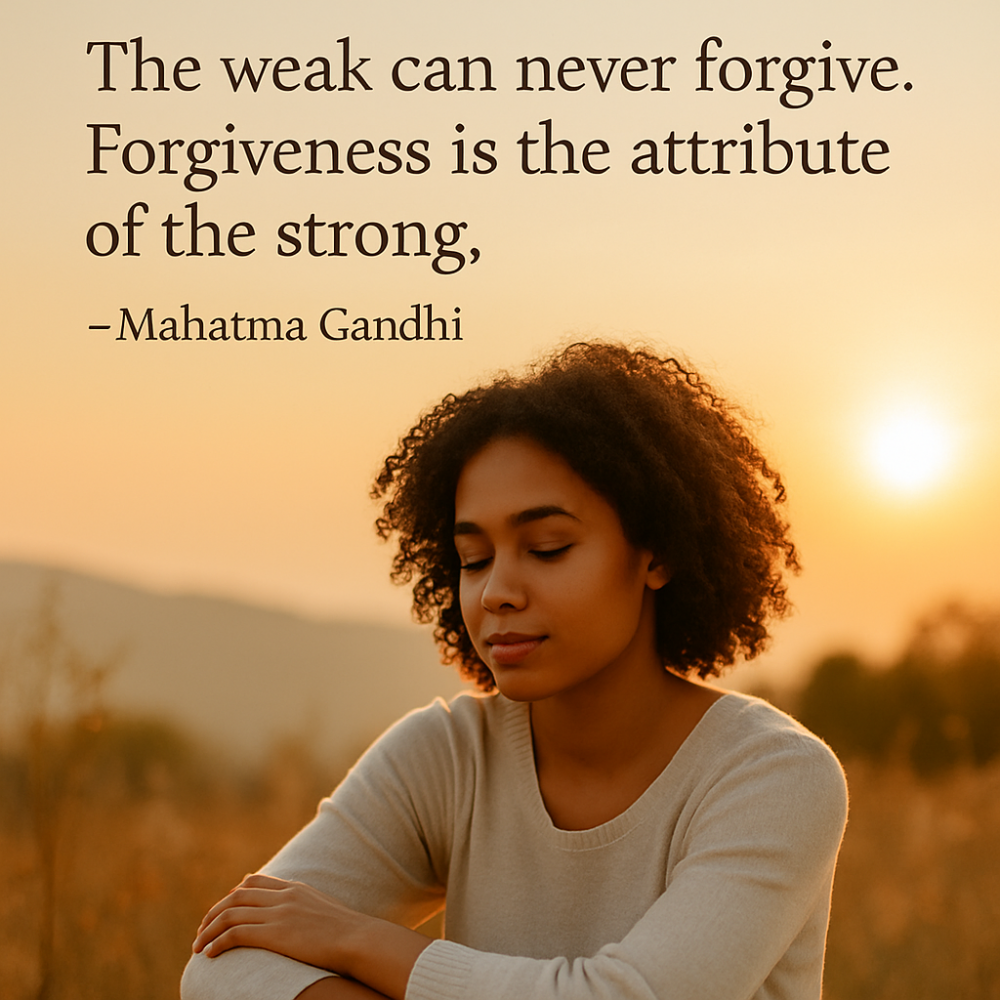
This article contains affiliate links.
What science says about forgiveness
Let’s begin with what the research shows. In recent years, scientific studies have confirmed what many spiritual traditions have taught for centuries: forgiveness has real, measurable benefits for your body, mind, and emotional well-being.
well-being.
According to the research, forgiveness can lead to:
Physical health benefits
- Lower blood pressure and improved heart health
- Decreased stress hormone (cortisol) levels
- Enhanced immune function
- Reduced inflammation and chronic tension
Mental and emotional well-being
- Reduced symptoms of depression and anxiety
- Improved mood and self-esteem
- Less emotional chaos and intrusive thoughts
- Greater life satisfaction and inner calm
Relationship and social benefits
- Increased empathy and emotional resilience
- Healthier relationships with others
- A deeper sense of meaning and alignment with personal values
These findings come from studies published in peer-reviewed journals, such as the Journal of Behavioral Medicine and the Journal of Clinical Psychology, as well as the extensive work of researchers like Dr Fred Luskin (Stanford Forgiveness Project) and Dr Everett Worthington (REACH Forgiveness Model).
Forgiveness, it seems, is not just good for the soul – it’s medicine for the whole self.

The deeper reason: There are no ‘others’ – we are all one
Sometimes, even when the research makes sense, we still hesitate. Something deeper holds us back – the belief that we’re right, that they don’t deserve it, that letting go would mean losing something. But at the soul level, forgiveness isn’t about what we term ‘fairness’, for that is purely a subjective opinion anyway. Forgiveness is really about truth.
Remember that spiritually:
- We are not separate; we come from the same Source and are all connected – always
- There are no true “others” – only different faces of the same divine consciousness
- Every person is on their own journey, shaped by their own soul plan
- You have attracted this situation – you may have even chosen it as part of your own soul plan to teach you something new
- Forgiveness helps us return to wholeness by dissolving the illusion of division
- Compassion does not excuse hurt – it transforms our relationship to it
From this perspective, the person who hurt you is not “the enemy.” They are a mirror, a messenger, and always a ‘teacher’. You don’t need to stay in contact with them or allow further harm. But if you can begin to see their words, deeds or actions as something that has taught you valuable life lessons, then you create a space for you to heal.
This is not always easy. But it is always freeing. And in time, with more understanding, we may be able to appreciate the situation and the person as the life-affirming soul lesson or teacher that they are. This is really the goal once you have forgiven the person or act. For once you can not only forgive, but appreciate the event, then you are really on your way to experiencing the world from a Source perspective.

How to forgive (when you’re ready)
Forgiveness is rarely instant. It’s more like a slow unfolding – a process that moves in layers, often circling back on itself. Sometimes we feel ready to forgive, only to discover another wave of pain rising later. This doesn’t mean we’ve failed. It means we’re human, and healing takes time.
To forgive someone doesn’t mean you excuse what they did, forget it happened, or allow the same behaviour to continue. Forgiveness simply means you’re ready to stop letting their actions live inside you and keep affecting you in the present. It’s a reclaiming of your energy now – and the power is within YOU!
Here are some gentle and practical steps to support the process when you feel willing to begin:
The path to forgiveness often includes:
1. Acknowledging the hurt
Pretending you’re ‘fine’ and lying to yourself or others about how you feel doesn’t create healing – it just buries the pain. Give yourself permission to name what happened and how it made you feel. Whether it was betrayal, neglect, manipulation or something else entirely, your experience of it matters. We all come to Earth to experience multiple things, and you may have chosen this exact experience because you wanted to understand it more and to learn to overcome it through love. So, you don’t have to justify or deny your feelings – they are valid simply because they are how you feel or felt at the time. However, they don’t need to be how you feel for the rest of your life!
2. Accepting that forgiveness is for you
Many people wait for an apology before they’ll even consider forgiving. But the truth is, forgiveness is an inside job. You don’t need anyone else to change, apologise, or even understand. Forgiveness is a declaration that your peace matters more than their recognition. You cannot change them anyway, so why bother? But you can change YOU, and that’s your responsibility.
3. Viewing things from a different perspective
This doesn’t mean denying the harm – it means exploring the possible roots of it. What wounds might the other person/people have been carrying? What fear or blindness might have shaped their choices? Compassion doesn’t excuse abuse or poor behaviour, but it opens the door to understanding.
4. Declaring your intent
Sometimes just saying the words: I am willing to forgive – even if you’re not fully there yet – begins to open the door. Write it. Speak it. Whisper it in meditation. The intention alone starts the shift.
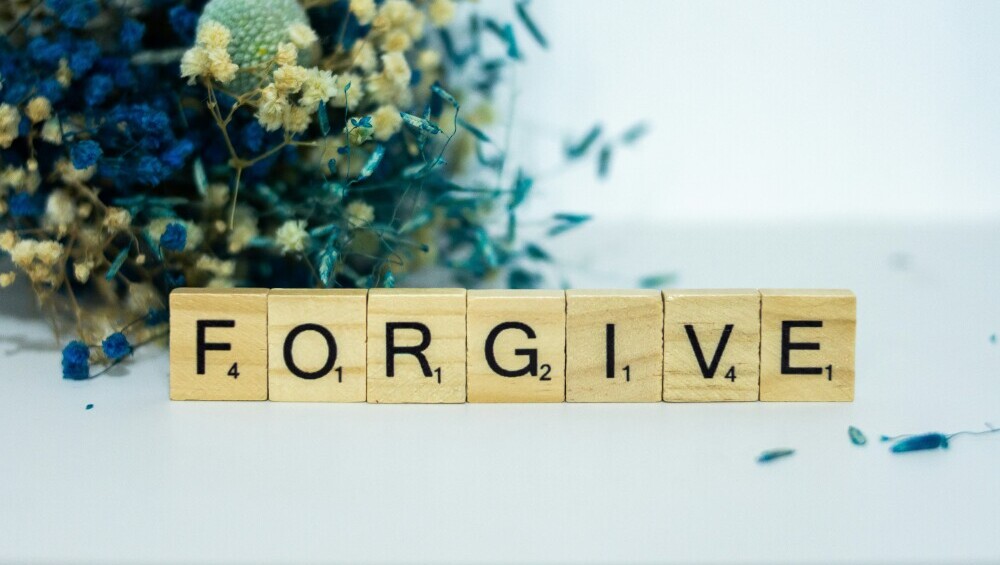
5. Letting the body release
If we pull a muscle it hurts and we all understand that, but we also store emotional pain in our bodies, muscles, organs, and nervous systems. Movement, tears, sound, and deep breathing can all help release what words alone cannot. Sometimes forgiveness is felt more deeply through embodiment than intellect.
You might simply say:
“I acknowledge this pain. I choose not to carry it anymore. I am willing to forgive, even if I don’t yet know how.”
Other practices such as tapping (emotional freedom technique), yoga or mindfulness are effective ways to release tension and emotional pain from the body, helping you feel lighter and more at ease. Here are some simple approaches:
Physical techniques
- Progressive Muscle Relaxation (PMR) – Tense and release different muscle groups to relieve stored tension
- Breathwork – Deep, controlled breathing (such as diaphragmatic breathing or box breathing) calms the nervous system
- Stretching & yoga – Gentle movement helps release emotional stress stored in muscles
- Massage & acupressure – Physical touch can help unlock tension and promote relaxation
- Cold therapy – Cold showers or ice baths can reset the nervous system and reduce stress
Emotional release methods
- Journaling – Writing down thoughts and feelings can help process emotions
- Crying – Allowing yourself to cry can be a powerful emotional release
- Talking Therapy – Speaking with a therapist or trusted friend can help you work through emotional pain
- Creative expression – Painting, dancing, or playing music can channel emotions into something tangible
Mind-body practices
- Meditation & mindfulness – Helps regulate emotions and bring awareness to bodily sensations
- Grounding exercises – Techniques like walking barefoot or focusing on sensory details can help reconnect with the body
- Vagus Nerve Stimulation (VNS) – Humming, singing, or deep breathing can activate the body’s relaxation response
6. Making peace with the other person
In some situations, you may feel a quiet nudge toward reconnecting with the person who hurt you – not to rekindle the relationship, or start an argument, but to release any lingering tension face-to-face or heart-to-heart. This is not always possible or appropriate, and it’s never required in order to forgive. But if you do feel called to speak to the person directly, it’s important to approach the moment with care.
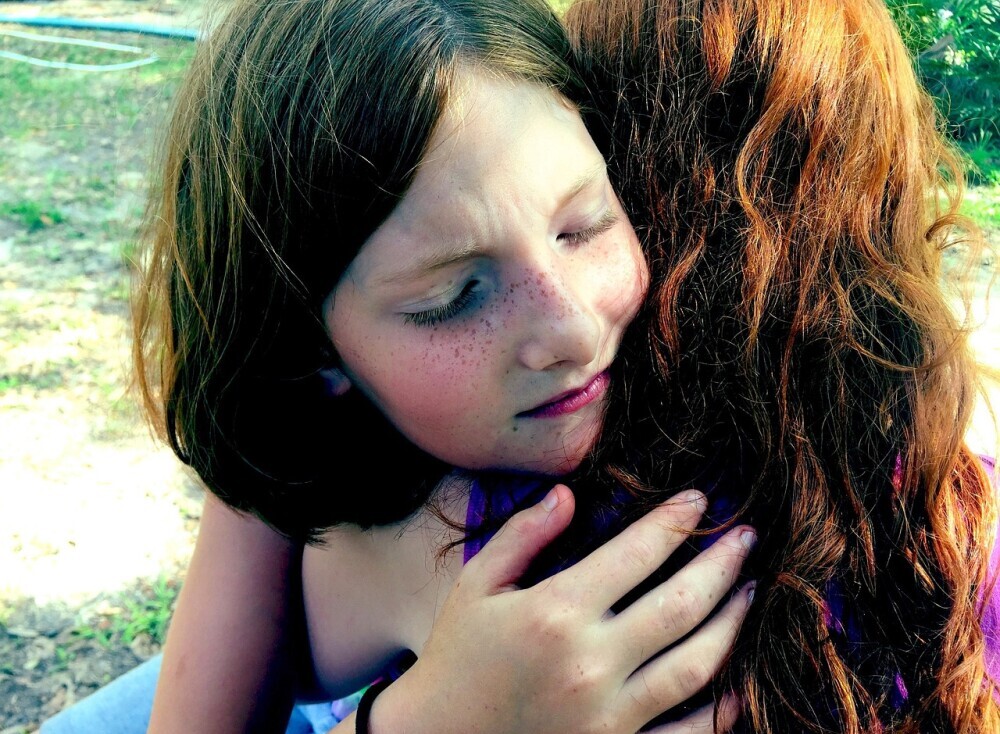
Making peace doesn’t mean trying to get them to admit fault, or opening yourself up to more pain. It simply means creating a space for honesty, boundaries, and perhaps, a sense of closure.
If you do choose to connect in person or by phone, here are some gentle suggestions:
- Bring a calm support person if you’re worried about feeling overwhelmed. Someone neutral and trusted can help hold the space and protect your energy
- Set your intention clearly beforehand. Know what you want to say, what you need (or don’t need), and what you’re willing to receive
- Avoid rehashing the past in detail. You don’t need to go over every wound – especially if it feels triggering. Stay grounded in how you feel now and what you’re choosing to let go
- Focus on speaking your truth, not changing theirs. You may never see eye to eye – and that’s okay. You’re here to express, not convince
- Use ‘I’ statements. This reduces the risk of things feeling like blame or accusation: “I’ve carried this pain for a long time and I’m ready to release it,” rather than “You never cared.”
- Be prepared for any response – or none at all. They may apologise. They may get defensive. They may say nothing. Your peace must come from within, not from their reaction
- End on your terms. If it starts to feel unsafe or unhelpful, it’s okay to walk away. You can still forgive, even if the conversation doesn’t go how you hoped
Meeting with someone who hurt you takes courage. But remember: the purpose is not to fix the past – it’s to free yourself from it.
Forgiving those you may never see again
Sometimes the person who hurt us is no longer part of our life. Perhaps they’ve passed away, moved on, or become unreachable in some way. And sometimes, it’s simply not safe or wise to reconnect.
Still, their impact lingers.
You may find yourself rehearsing old conversations or waiting for an apology that will never come. But forgiveness is not dependent on the other person. It doesn’t require their awareness, participation, or agreement. You don’t need them in the room. You just need your own willingness.
When closure isn’t possible in person, rituals and sacred practices can help you create it energetically. These small, symbolic actions can speak to your deeper self in ways that logic cannot.
 Try one of these simple release rituals:
Try one of these simple release rituals:
Write a letter you never send
Say everything you need to. Be honest, raw, and unfiltered. When you’re done, destroy the letter – burn it (safely), rip it up, or bury it in the earth. Let it go physically, as a symbol of releasing it emotionally.
Light a candle for them
Sit quietly, focus on your breath, and picture the person. Speak their name. Then say: I release you. I forgive you. I let this go. Imagine the flame holding your intention.
Use water as a purifier
In the shower, bath, or even standing in the rain, say: This pain no longer belongs to me. Imagine the water carrying it away from your body and energy field.
Make a nature offering
Hold a small object (like a stone) as a symbol of the burden you’ve carried. Place it somewhere in nature and leave it there. As you walk away, say: I release this now. I choose freedom.
Self-forgiveness: Returning to your own heart
Often, the most difficult forgiveness is the one we owe ourselves. We may carry guilt over what we said or didn’t say, for choices we made, for staying too long – or leaving too soon.
We often hold ourselves to impossible standards. But spiritual growth isn’t about perfection – it’s about awareness. You can learn from your past without punishing yourself for it.
Self-forgiveness invites us to look at the version of ourselves who made those choices and say: You were doing the best you could. You didn’t know then what you know now. And even now, you are still learning.
Let that be enough.
? Remind yourself gently:
- “I forgive myself for not knowing.”
- “I release the shame I’ve been carrying.”
- “I am allowed to grow, and I am still worthy of love.”
- “I offer myself the same compassion I would give a dear friend.”
- “I am and always will be, enough.”
Forgiveness of self is not indulgence – it’s healing. It’s how we begin to love ourselves again.
Conclusion: Returning to wholeness
Forgiveness is not about forgetting. It’s about remembering who YOU truly are.
You are not the pain. You are not the resentment. You are not the story of what happened to you. You are the one who gets to choose what stays in your heart.
Sometimes forgiveness is swift, like a release of breath. Sometimes it’s a slow, steady untangling. Either way, every small act of letting go is a return to your own wholeness.
And through this journey, we come home to a deeper truth:
We are all from the same Source. There are no others.
Only One, learning how to love itself – through each different fractal we call our personalities, again and again.

? References & Further Reading
- Luskin, Fred (2002). Forgive for Good: A Proven Prescription for Health and Happiness. HarperOne.
– Dr Luskin, director of the Stanford Forgiveness Project, explores how forgiveness improves mental and physical health. - Worthington, Everett L. Jr. (2006). The Power of Forgiving: Forgiveness and Reconciliation. Templeton Foundation Press.
– A leading psychologist in forgiveness research, Dr Worthington developed the REACH Forgiveness Model, widely used in clinical and personal growth settings. - Wade, N. G., Worthington, E. L., & Meyer, J. E. (2005). “But do they work? A meta-analysis of group interventions to promote forgiveness.” Journal of Counseling Psychology, 52(2), 172–187.
– A meta-analysis showing that forgiveness-based interventions significantly reduce depression and increase well-being. - Lawrence, J. W., & Kurpius, S. E. R. (2000). “Legal System Involvement and Psychological Functioning in Young Men.” Journal of Behavioral Medicine, 23(3), 349–367.
– Forgiveness was found to be associated with improved immune function and reduced stress indicators. - Toussaint, L., Shields, G. S., Dorn, G., & Slavich, G. M. (2016). “Effects of lifetime stress exposure on mental and physical health in young adulthood: How stress degrades and forgiveness protects health.” Journal of Health Psychology, 21(6), 1004–1014.
– Highlights how forgiveness can act as a buffer against the effects of chronic stress.
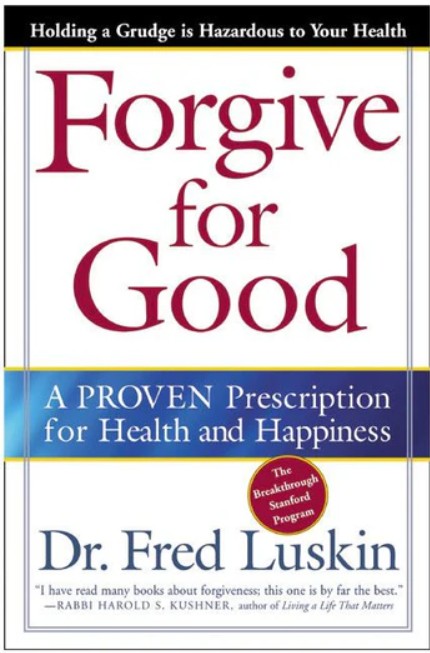
Related posts
How to find happiness in life through unconditional living

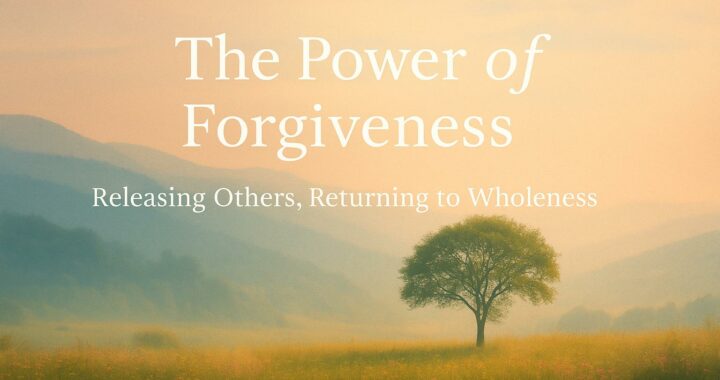
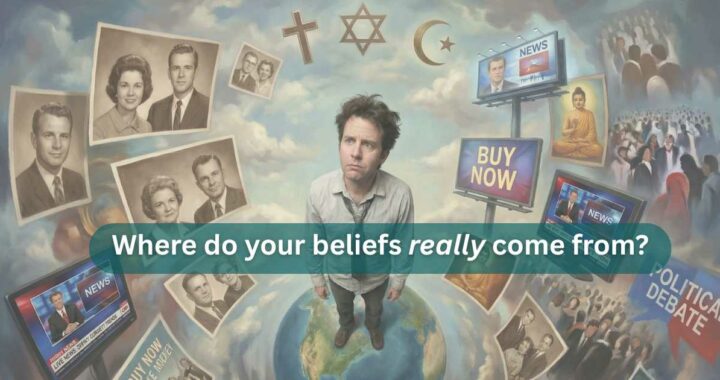
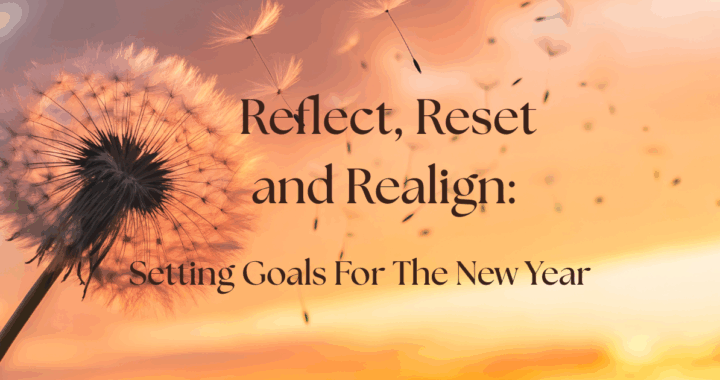
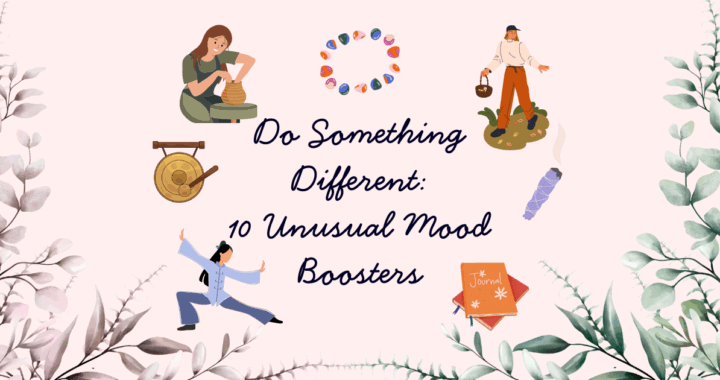
This article on forgiveness is a powerful reminder of how holding onto pain can prevent us from fully living. I love how it emphasizes that forgiveness is more about freeing ourselves than excusing others’ actions. The blend of science and spiritual insight shows how forgiveness can transform both our mental and physical health. I particularly like the idea that forgiveness doesn’t require the other person’s acknowledgment. It’s a personal choice for peace. How do you think we can make forgiveness a more regular practice in our lives, especially when the hurt feels too deep to let go of?
H Kavitha. Good to hear from you and I’m so pleased that you liked this article on the power of forgiveness. I like that you’ve picked up on the fact that forgiveness is about freeing ourselves because it is only really ourselves that we can change. We have no influence on others really, but forgiving allows you to let go of the past and move on. In answer to your question, when the hurt feels very deep, the way forward is to acknowledge that hurt rather than try to hide it. You can acknowledge it, but then the inner work is to see what you could have learned from that experience and begin to be grateful for that. When you start to see that you have grown as a person as a result of that experience, you are on your way to being able to forgive the other person, and that’s the path to personal freedom. Wishing you well. Gail
I thought this article was a beautiful reminder of how powerful forgiveness can be. I loved the message that forgiveness is really about freeing yourself, not excusing what happened. Gail’s blend of science and spirituality made it even more convincing. In my opinion, this is the kind of advice that helps you heal and move forward. In my opinion, definitely a message more people need to hear.
Hi Lesley. Thanks for your kind comments on this article. I’m so glad you found it a useful reminder and the main message about forgiveness freeing up your energy. I appreciate you like the mix of science and spirituality too as really they are all the same, just different ways of interpreting the same thing. Finally, I’m excited that you think that this is a message the more people need to hear as I agree with you. It’s time to wake up our society to the power we do have and stop giving it away to others through wrong thinking and believing what we have been told up to now. We are immensely powerful and creative beings and are unstoppable when we realise this. All the best to you and yours, Lesley. Gail